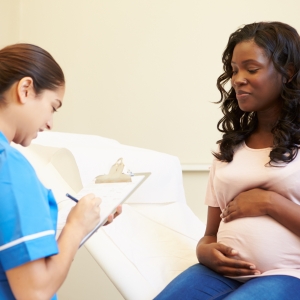Addressing the High Rates of Adverse Birth Outcomes and Infant Mortality Among U.S.-Born Black Women
April 18, 2018- Research
Research has shown that pregnancy outcomes for African-American women lag behind those for other demographic groups. In order to close this gap, health care providers must recognize the impact of social determinants of health.
April is National Minority Health Month. Tyan Parker Dominguez, clinical professor at the USC Suzanne Dworak-Peck School of Social Work, has spent much of her career examining the impact of social determinants of health on pregnancy, particularly among U.S.-born African-American women. Her research has revealed the deep impact of social inequity on the health outcomes of minority women, and what it will take to close this gap.
Addressing Misconceptions Surrounding Health Disparities
According to research conducted by Parker Dominguez, Caucasian and Asian women have the best pregnancy outcomes in the U.S., followed by Latinas, Native Americans and finally, African Americans.
“African-American women have disproportionately high rates of preterm delivery, low birth weight and infant mortality,” Parker Dominguez said. “For African-American women, these rates are two times higher than the rates for non-Hispanic white women, and rates of maternal mortality are three times higher.”
“We’ve made advances in neonatal medicine and obstetric medicine, so we know how to care for moms and babies. Issues of equitable access and equitable treatment, though, are still very much a concern and need to be addressed,” Parker Dominguez said.
A number of studies have reported a correlation between socioeconomic status and pregnancy outcomes. But that is not what is at play here. “The issue of adverse birth outcomes is not a poor black women issue,” Parker Dominguez continued. “It’s a black women issue. More specifically, it is a U.S.-born black women issue.”
While higher socioeconomic status strongly correlates with better health in Caucasian women, for African-American women, higher socioeconomic status does not guarantee better outcomes. Just like their lower-class counterparts, middle class and upper-class African-American women experience preterm delivery and low birthweight outcomes, with infant mortality rates much higher than those experienced by Caucasian women of similar economic standing. In fact, the disparity in adverse birth outcomes between Caucasian and African-American women is actually wider at higher socioeconomic levels: an infant born to a college educated African-American woman has a higher risk of death by its first birthday than an infant born to a white mother without a high school diploma.
This racial gap is most dire for U.S.-born African-American women. Foreign-born black women delivering in the U.S. actually experience pregnancy outcomes similar to Caucasian women. Their U.S.-born daughters do not enjoy the same level of childbearing health. Rather than genetics, Parker Dominguez and other researchers believe these health trends signify the fundamental importance of social determinants of health.
High-Stress Communities, High-Risk Pregnancies
Disparities in health outcomes for African-American women must be considered within a larger societal context, one that extends beyond simple socioeconomic standing. “Populations of color do not have the same access to opportunity in our society because of the sociopolitical history of our country, which has oppressed people of color in a host of different ways,” Parker-Dominguez said. “Ultimately, the data highlights the impact of the social environments in which women are living on their health.”
The communities in which minority women are raised, educated, live and work are often characterized by high levels of stress, which can have lasting, detrimental impacts on their health and the health of their children. Racism-related factors are often a root cause of stress in these minority communities.
“If you have to deal with a chronic stressor that never abates, like racism,” Parker-Dominguez said, “then your body’s stress-response system is continually engaged.” Over time, a hyper-engaged stress-response system wears down the body’s physiological systems. This, in turn, introduces new health risks, including a higher chance of preterm birth and adverse birth outcomes.
Closing the Gap
Recognizing that these disparities in birthing outcomes are firmly rooted in societal inequity is the first step towards closing these gaps.
“We have the power to bring about change,” Parker-Dominguez said. “The gap between black and white women has been shown to close during progressive periods in history, and has been positively impacted by holistic interventions that account for the complex social factors at play.”
Programs designed explicitly to promote healthy pregnancy outcomes in vulnerable minority communities can be especially impactful. These programs focus on helping women maintain pre-pregnancy health while curbing the risks of preterm delivery, mortality and low birth weight.
“There’s been a shift in focus to what’s called preconception care and a life course perspective, which emphasizes promoting health from the very beginning of life,” Parker-Dominguez said. “If we focus on creating more equitable social environments and providing the support that families need to have healthy babies and raise healthy and happy children, we’ll end up with a healthier and happier society.”
To reference the work of our faculty online, we ask that you directly quote their work where possible and attribute it to "FACULTY NAME, a professor in the USC Suzanne Dworak-Peck School of Social Work” (LINK: https://dworakpeck.usc.edu)
